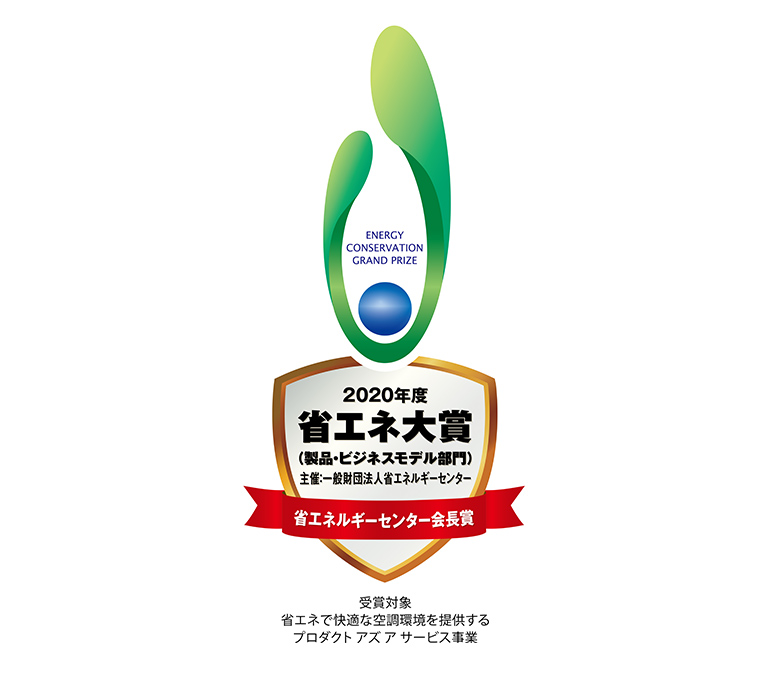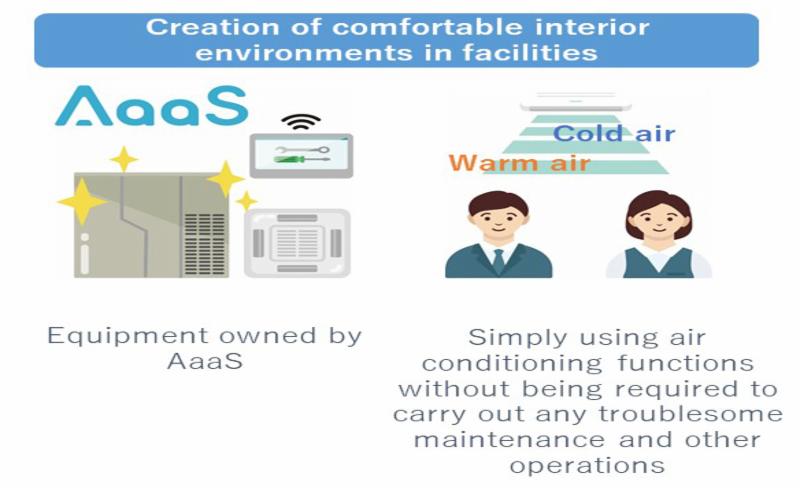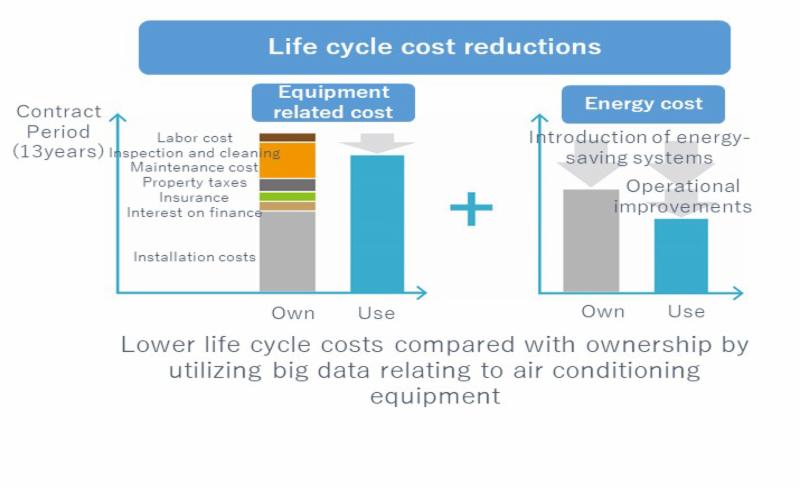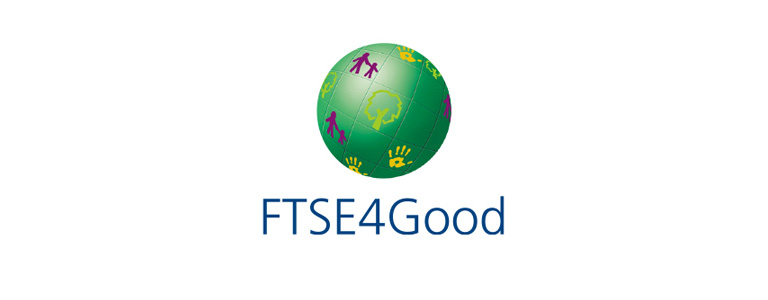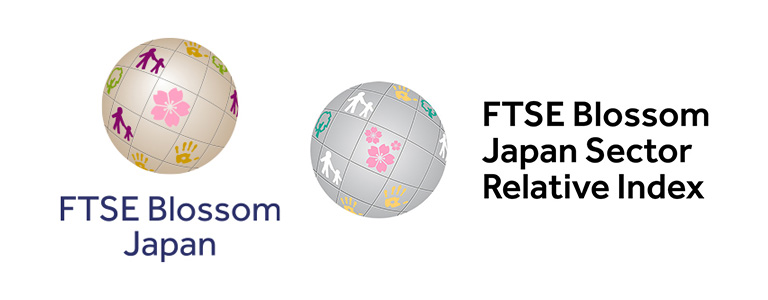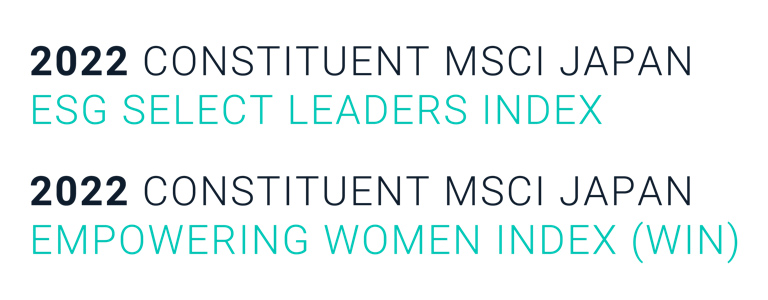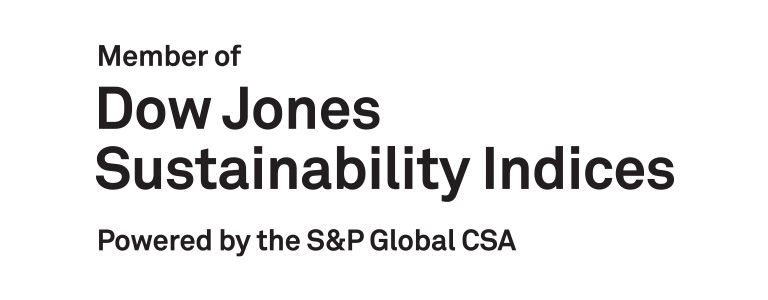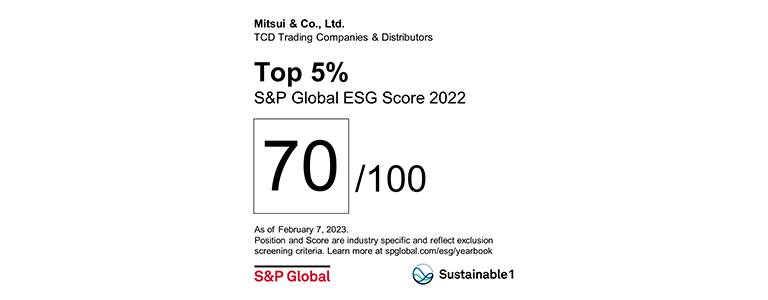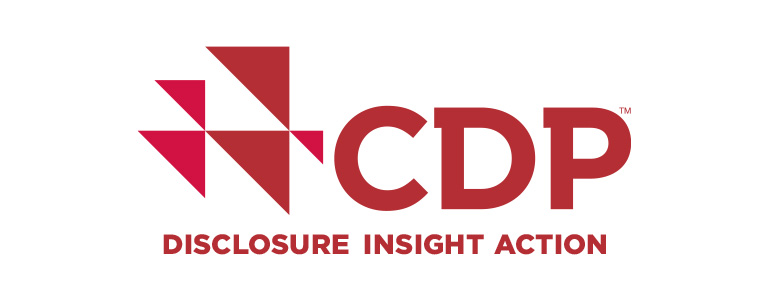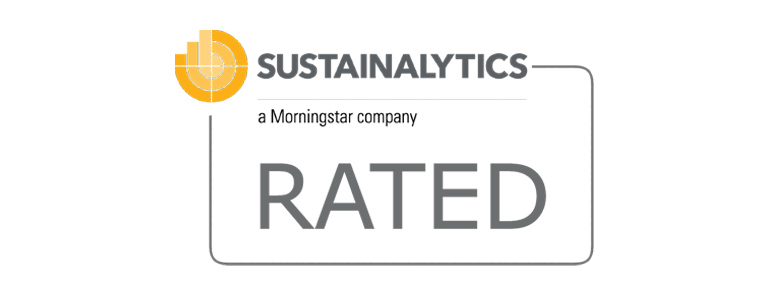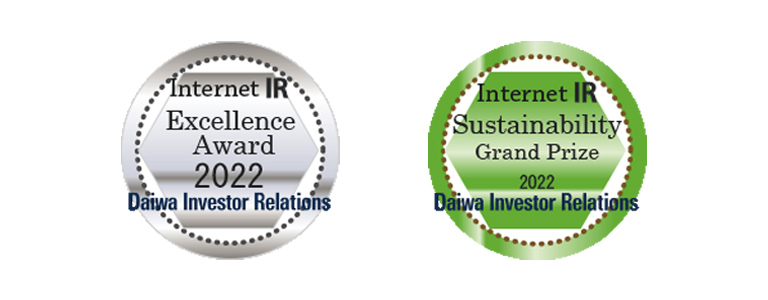Environment
Circular Economy
Policies and Basic Approach
The transition towards a circular economy is accelerating, particularly in Europe, with the viewpoint of efficient use of limited resources, the mitigation of environmental impact, and the reduction of GHG emissions. Mitsui & Co. promotes the recycling of above-ground resources in addition to the development, processing, and sale of raw materials and subterranean resources for various products. We recognize that in the transition to a circular economy both risks and opportunities will influence our businesses. Risks include stricter waste regulations and reduced demand for raw materials. Opportunities include new business chances as we seize upon the needs of our business partners who are conscious of and responding to the circular economy.
Based on "Create an eco-friendly society" which is one aspect of our Materiality, our Environmental Policy stipulates that we will work to improve efficiency in the use of resources and energy and reduce waste, and by pursuing business in the circular economy, we will work to achieve economic growth while reducing our burden on the environment.
We have identified the circular economy as one of the key themes for sustainability management in our Medium-term Management Plan 2023. We are encouraging initiatives in circular economy businesses to achieve firstly, economic growth by creating added value in resource circulation while reducing resource and energy inputs and the amount of waste generated; and secondly, a reduction in the environmental burden.
We are involved in a wide range of goods and services across all value chains, from upstream to downstream. We have been working to resolve issues for each stakeholder in our value chains. We are using the knowledge and global networks that we have developed through our businesses. In all steps of the value chain we are creating value through material design, and are suggesting alternative products and methods that have low environmental impact and that allow for the effective utilization of by-products and residues produced by the goods that we deliver. We will take up new business opportunities created by the transition to the circular economy and will promote the expansion of existing businesses, which will lead to the strengthening of our earnings base and the enhancement of our corporate value.
Business Models in the Circular Economy
We are engaged in business centered on the growth of both "trading" and "business investments." We use the networks with our customers and partners that we have developed in a wide range of businesses, from upstream to downstream. We suggest resources and raw materials suitable for manufacturers' new designs. We recover used resources and reuse them in other business fields. In this way, we show our unique comprehensive strengths, collect and analyze information, and seize opportunities to create new business models and new businesses in the transition to the circular economy.
Major Risks and Opportunities, and Our Response Strategies
We are expanding a wide range of businesses into many countries and regions, from upstream to downstream. We have analyzed and identified the following risks to our businesses in the transition to a circular economy.
| Policy and legal risks |
|
|---|---|
| Technology risks |
|
| Market and sales risks |
|
| Reputational risks |
|
*Business model based on a linear economy ('take-make-consume-throw away' pattern) in which procurement, production, consumption, and disposal flow in one direction, with mass production, mass consumption, and mass disposal based on disposable products.
In each segment, we assess the internal and external business environment, identify the surrounding risks and opportunities, and formulate strategies for that business.
Please scroll horizontally to look at table below.
| Segment | Risks | Opportunities | Strategies |
|---|---|---|---|
| Mineral & Metal Resources |
|
|
|
| Energy |
|
|
|
| Machinery & Infrastructure |
|
|
|
| Chemicals |
|
|
|
| Iron & Steel Products |
|
|
|
| Lifestyle |
|
|
|
| Innovation & Corporate Development | No particular risks |
|
|
Goals and Targets
Segment Goals
We aim to create new businesses , while analyzing the risks and opportunities associated with the transition to a circular economy in each segment.
| Segments | Goals | Progress |
|---|---|---|
| Mineral & Metal Resources |
|
|
| Energy |
|
|
| Machinery & Infrastructure |
|
|
| Chemicals |
|
|
| Iron & Steel Products |
|
|
| Lifestyle |
|
|
| Innovation & Corporate Development |
|
|
Sustainability Governance and Oversight
Sustainability Committee
The Sustainability Committee works under the Corporate Management Committee to plan, formulate and provide recommendations on basic management policies, business activities, and corporate policies and strategies related to the circular economy.
The Sustainability Committee is structured so that its activities are appropriately supervised by the Board of Directors, and matters discussed by the Sustainability Committee are regularly discussed and reported to the Corporate Management Committee and the Board of Directors.
| Officer in Charge | Makoto Sato (Representative Director, Senior Executive Managing Officer, Chief Strategy Officer (CSO), Chairperson of the Sustainability Committee) |
|---|---|
| Administrative Office | Corporate Sustainability Div., Corporate Planning & Strategy Div. |
Please refer to the links below for more information on Mitsui’s Sustainability Management Framework and the activities of the Sustainability Committee.
Business Unit Task Force
The Circular Economy Task force has been set up spanning several Business Units. The Taskforce analyzes the external environment and examines business opportunities at each Business Unit. The Taskforce reports the results of its analyses and the details of its considerations to the head of each Business Unit and the management members.
| Basic Materials Business Unit | Launched a task force in October 2018 as a platform for exchanging information on the circular economy within the Business Unit, and regularly disseminating information related to the circular economy within our Company. In April 2020, the Circular Economy Promotion Team (CET) was formed under the direct control of the Business Unit's COO with 1 full-time and 4 part-time members and began working on specific circular economy projects. With its work-volume increasing, CET has grown into 1 full-time and 9 part-time members (2 of which are main assignment members). |
|---|---|
| Performance Materials Business Unit | In June 2021 the Circular Economy Promotion Team (CET) was set up under the direct control of the Unit's general manager (with 3 full-time and 7 part-time members). The CET is involved in the creation of new circular economy-type businesses within the Business Unit, providing support for cross-Unit initiatives, and the dissemination of related information. |
| Iron & Steel Products Business Unit | In March 2021 the Green Steel Initiative Team was set up under the direct control of the Unit's general manager (with 4 full-time and 2 part-time members). Together with the coordinators (11 people) in each division and at the Unit's overseas offices, the Team creates new businesses involving such areas as green procurement, hydrogen and CCUS, electrification, and the circular economy. The Team also provides support for cross-Unit initiatives, and the dissemination of related information. |
Collaborating with Stakeholders
Participation in Initiatives
We are promoting and expanding our efforts for the circular economy through participation in initiatives. Our participation in each initiative is decided after confirming that it is consistent with our basic policy on the circular economy.
CLOMA (Japan Clean Ocean Material Alliance)
CLOMA was established in January 2019 to find solutions to the emerging global challenge of marine plastic debris through the sustainable use of plastic products, the development and introduction of alternative materials, and the acceleration of innovation. Mitsui is one of the 26 secretary companies. As of May 2022, 468 companies and organizations have joined CLOMA, including a few of Mitsui's subsidiaries namely, Mitsui & Co. Plastics Ltd., Mitsui Bussan Packaging Co., Ltd., and Vendor Service Co., Ltd.
Mitsui participates in the Dissemination & Promotion Working Group, which shares technological information to make it easier to select the best alternative materials for each application, the Technology Working Group, which holds technological exchanges and technological seminars on the latest development results, and the International Working Group, which collects information through collaboration with international organizations and research institutions and provides information and technological consulting services in developing countries. Mitsui chairs the Indonesia Cooperation Working Group, which was formed under the supervision of the International Working Group, and plans contributions with a focus on specific countries. Looking ahead, Mitsui will continue to take the actions needed to help resolve the problem of marine plastic waste.
CEFLEX (Circular economy for flexible packaging)
CEFLEX is a European collaborative consortium of companies and associations representing the entire value chain of flexible packaging. CEFLEX is exploring the development of infrastructure systems to collect, sort, and recycle plastic flexible packaging. Mitsui has participated in the consortium since 2018 as one of more than 200 companies that are involved in the plastic packaging materials value chain. Mitsui has been playing active roles in various work groups and will continue to contribute to the realization of a circular economy through its participation in CEFLEX.
Japan Partnership for Circular Economy
As the trends towards a circular economy are accelerating globally, the Japan Partnership for Circular Economy has been established by the Ministry of the Environment, the Ministry of Economy, Trade and Industry, and the Nippon Keidanren Federation, to enhance public-private collaboration and further foster the understanding and support of a wide range of stakeholders, including companies in Japan, for the circular economy. Mitsui has been participating in this partnership since March 2021. Through this partnership, we will help improve the competitiveness of Japanese companies in the field of the circular economy.
Collaborating with NGOs/NPOs through Environmental Funds
A Project to Reduce Levels of Marine Waste by Studying the Urban Arakawa River
At the annual general meeting of the World Economic Forum (WEF) held in January 2016 (Davos 2016) it was announced that by 2050, the amount of plastic waste floating in the ocean will exceed the amount of fish unless each country introduces a strict recycling policy. At present, some 12 million tons of plastic waste are dumped into the oceans each year. That amount is calculated to be equivalent to one garbage truck dumping its contents into the ocean every 10 to 30 seconds. Furthermore, this amount of plastic debris is forecast to double by 2030 and to double again by the 2050s.
Researchers say that more than 60% of marine debris is derived from municipal waste that flows to the sea via rivers. Marine debris generated by Japan is estimated to be 20 to 60 thousand tons annually, based on data sources from overseas. Hardly any studies have been made in Japan on how much municipal (river) waste is created per person.
We are involved in activities to reduce the sources of marine debris. Through our support for the NPO Arakawa River Clean-aid Forum, a survey of the garbage flowing from riverside towns into the river at one of the Arakawa River tributaries (enclosed) is being conducted. The aim is to gain an understanding of the per-capita amount of garbage generated, and also investigate the amount of river waste generated by riverside inhabitants, which has hardly been studied at all to date.
Creation of a Sharing Society Based on the Circulation of Used Soap
Happy Steps is an NPO organization set up after its founder, Reiko Arai, realized the value of soap from her experiences with people in emerging countries suffering from skin diseases due to a lack of access to soap to wash themselves. All the core members of Happy Steps are women and they shine the spotlight on the value of second-hand things like used bicycles, vinyl umbrellas, and other items that are "such a waste to throw away." The NPO strives to reuse these items and create jobs in the process. In support of this philosophy, we are involved with reducing the amount of soap waste that was previously dumped as industrial waste, by providing subsidies to Happy Steps. As a specific example, every year 280 tons of used soap from hotel rooms plus waste soap generated in soap manufacturing is re-processed at welfare workshops and then reused by donating it to child welfare facilities and the poor in developing countries. To this end, we aim to contribute to environmental conservation and raise awareness in society as a whole by building recycling systems in collaboration with hotels and manufacturers.
Collaborating with Local Organizations through Environmental Funds
A Community Waste Management Improvement Project for Waste Pickers (Waste Collectors) in Khulna, Bangladesh
The Japan Environmental Education Forum (JEEF) is an NGO that helps to develop and train people who will be responsible for the creation of a sustainable society, through environmental education that emphasizes practical experience and dialogue. We are aiming to build a model case to improve waste management in the community through the collaboration of local government, waste pickers, and the residents of Khulna. Through our support for JEFF, consideration is being given to the role that waste pickers (waste collectors) play in waste management in Khulna city in Bangladesh. This is achieved by raising social awareness of waste pickers, actively involving residents (including the pickers) in waste management, promoting environmental education about waste management within the local region, and through projects to demonstrate the value of the waste that the waste pickers collect.
Initiatives
Initiatives by Segment
Mineral & Metal Resources
We are actively promoting recycling to meet the needs of a recycling-oriented society. Our subsidiary Mitsui Bussan Metals Co. promotes the recycling of various non-ferrous scrap such as aluminum, copper, and titanium, and waste printed circuit boards contained in electrical appliances. Sims (our investee and one of the world’s leading recyclers) recycles metals and processes municipal waste from New York City. Sims is working on a power generation business utilizing methane gas generated from landfills. Our affiliated company Kyoei Recycling Co. uses automobile crusher dust as feedstock for a gasification melting furnace, to produce gas for use as fuel at the nearby Kyoei Steel Yamaguchi Division works. It sells the co-generated hot slag to smelters.
Energy
Tomakomai Biomass Power Generation Co., Ltd., which was established jointly by Mitsui & Co., Iwakura Corporation, Sumitomo Forestry Co., Ltd., and Hokkaido Gas Co., Ltd., mainly uses unused wood thinned from forests in Hokkaido to create woodchips to be used as fuel for power generation. The company transmits electricity in Hokkaido 24 hours a day. The source of the wood is the material that is periodically thinned from forests, to enable the remaining trees to grow healthily. Until now, the forestry industry has had little use for this thinned material and it has simply been dumped in the forest. By operating a circular power generation business that makes effective use of this waste material, not only is the CO2-absorbing capacity of the forests enhanced, but we are also contributing to local communities by revitalizing forestry in Hokkaido and helping to improve the conservation function of the living environment.
Machinery & Infrastructure
As in developed countries, we expect the transition from "ownership" to "use" will accelerate in Central and South America. We have invested in Inversiones Mitta SpA ("Mitta"), which owns Autorentas del Pacifico SpA, Chile's largest fleet management operating and car rental company. Leveraging Mitta's vehicle operating lease (BtoB), which has a large market share in the Chilean mining and energy industries, and its long-running local car rental business (BtoC), we are striving to promote the leasing, rental, and sharing service businesses and are working to expand the value chain on the consumer side.
Chemicals
Circular Pet, Co. Ltd, a joint venture established by our Basic Materials Business Unit, together with Veolia Japan K.K. and Seven & i Holdings Co., Ltd., will build a new PET bottle recycling plant (recycled PET resin production capacity: approx. 25,000 tons per year) in Tsuyama City, Okayama Prefecture. Starting with this project and initiative, we will contribute to the establishment of a circular economy by investigating and promoting similar projects to help solve waste plastic problems in Japan and overseas.
Iron & Steel Products
SHO-BOND & MIT Infrastructure Maintenance ("SB&M") which was established through a joint investment between Mitsui and SHO-BOND Holdings ("SHO-BOND") has established CPAC SB&M Lifetime Solution Co., Ltd. joint-venture company with partner The Concrete Products and Aggregate Co., Ltd ("CPAC") (a core company of the building materials business of Siam Cement Group ("SCG")). The objective is to develop a maintenance business for infrastructure structures in Southeast Asia. (Investment ratio: CPAC 51%、SB&M 49%) SB&M will utilize Thailand's leading conglomerate SCG's business base, Mitsui’s global network, and SHO-BOND's knowledge and technical skills for preventive maintenance to preserve and lengthen the service life of infrastructure, with the goal of responding to infrastructure maintenance needs in Southeast Asia, with Thailand as a hub.
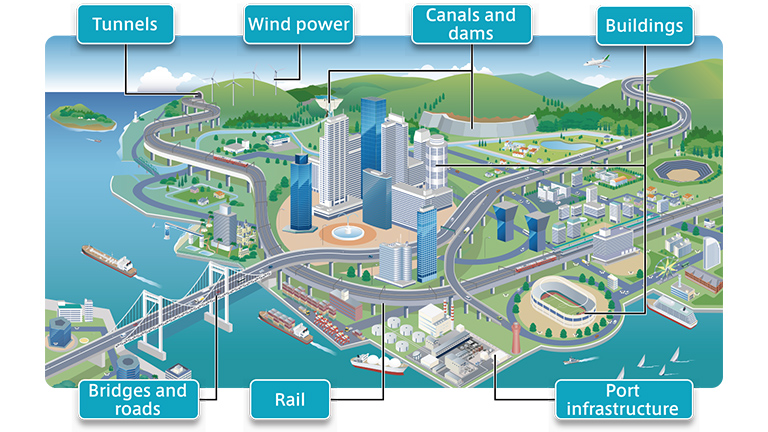
Lifestyle
Our Food Business Unit is setting up a circulating system through the establishment of an agricultural product value chain and animal protein value chain that effectively use by-products generated during the production of agricultural and livestock products. To give some specific examples, the circulating system use by-products from soybeans, rapeseed, wheat, sesame, and corn, along with livestock by-products and fisheries residue, as livestock and fisheries feed. Cut strawberries with their leafy calyxes are squeezed to make juice. Tea leaf residue is used as a raw material for compost. Sugar cane fiber is used as fuel for power generation, and waste cooking oil are reused as livestock and fisheries feed and aviation fuel. Excess sludge generated by wastewater treatment will be dried and used as boiler fuel. Activities such as these are promoting the expansion of sales channels for by-products.
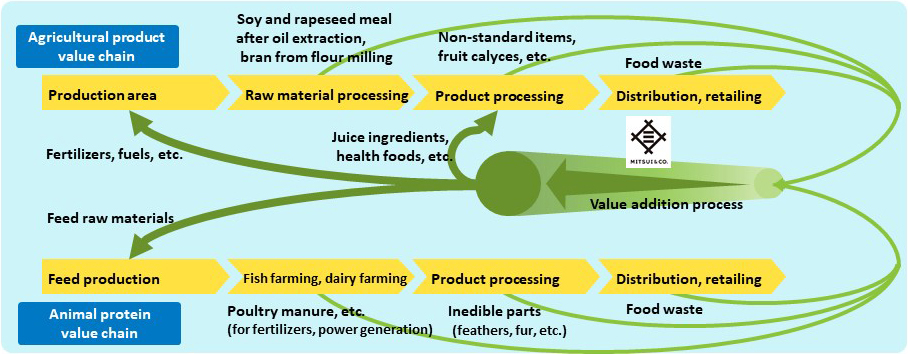 Cyclical Systems for the Effective Utilization of By-products
Cyclical Systems for the Effective Utilization of By-productsInnovation & Corporate Development
Our subsidiary MKI (Mitsui Knowledge Industry) has a cloud-based energy-saving management service "GeM2" that supports both energy-saving measures and comfort maintenance, for clients that own multiple facilities such as movie theaters, supermarkets, and fitness gyms. Temperature and humidity data from each facility are gathered and sent to a data center to optimally manage the air conditioning (gas or electric) and fans.
In addition to the start/stop management of conventional demand controllers, the system's precise control of temperature and operating mode achieved a significant energy saving while maintaining comfort. MKI also offers a solar panel generation monitoring service that remotely monitors from the cloud. Even though solar power facilities are described as being "maintenance-free," there are many maintenance issues that include panel damage, dirt and other surface fouling, equipment failure, and aging deterioration. Systems that can quickly become aware of such issues need to be considered, and we are taking initiatives to respond to these needs. We are developing a subscription-based service that provides users with comfortable air-conditioned spaces for a fixed monthly fee through Air As A Service Co., Ltd. ("AaaS"), a company that we established with Daikin Airtechnology and Engineering Co., Ltd. AaaS installs and owns air conditioning equipment on behalf of the facility owner and provides optimal operation management for each facility by utilizing an IoT system which remotely monitors the operating status of each air conditioner 24 hours a day, 365 days a year and by analyzing the operational data of the air conditioning equipment. By visualizing the operating status of equipment and eliminating waste, energy consumption and related costs can be reduced by approximately 20% compared with before the service was introduced. Moreover, by understanding the operating duration and load, and performing appropriate preventive maintenance, the service life of the equipment can be extended. We will continue to support the improvement of energy efficiency in buildings, factories, and other facilities through AaaS. AaaS received an Energy Conservation Center Chairman's Prize in the Products and Business Model category at the Energy Conservation Awards 2020 sponsored by the Energy Conservation Center, Japan.
